redirection.io vous permet de créer des redirections de manière très simple et intuitive, dans un souci d'efficacité et de performance. Que vous ayez besoin de redirections à des fins marketing, pour suivre les campagnes de marketing sur les médias sociaux, pour gérer les produits en rupture de stock, pour réorganiser le trafic de votre site Web après une refonte, ou simplement pour corriger les erreurs quotidiennes, nous vous fournissons la solution parfaite pour mettre en place des redirections sur votre site Web de manière sûre et simple. La création de redirections HTTP est utile dans de nombreux contextes : vous pourrez en apprendre plus dans notre base de connaissances.
Un moteur de redirections professionnel et complet
Le moteur de redirections propsoé par redirection.io est conçu pour les sites web professionnels et répond à une multitude de besoins : suivi technique du trafic, gestion des campagnes marketing, optimisation SEO, etc. Il est conçu pour être à la fois puissant et facile à utiliser.
- créez tout type de redirection
- support des 301, 302, 307, 308
- redirections absolues ou relatives
- marqueurs et expressions régulières, avec facilité !
- redirections géolocalisées
- vérifiez vos redirections avec des exemples
- imports et d'exports de données
- accédez aux journaux d'utilisation de chaque règle
- prévisualisez l'effet d'une règle avant qu'elle ne soit en production
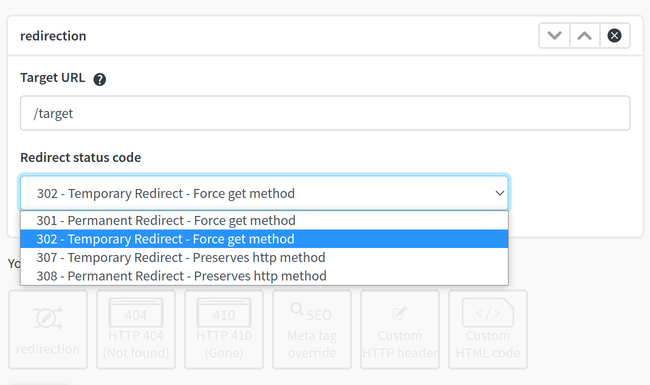
Créez tout type de redirection
redirection.io prend en charge tous les types de redirections HTTP, qu'elles soient permanentes ou temporaires. Nous permettons également de créer des redirections 307 et 308 moins courantes, si cela fait partie de vos contraintes ou choix techniques.
Notre moteur de redirection est très flexible, performant, et peut s'adapter à toutes les exigences marketing ou commerciales.
Lisez nos documentation sur les différents types de redirection
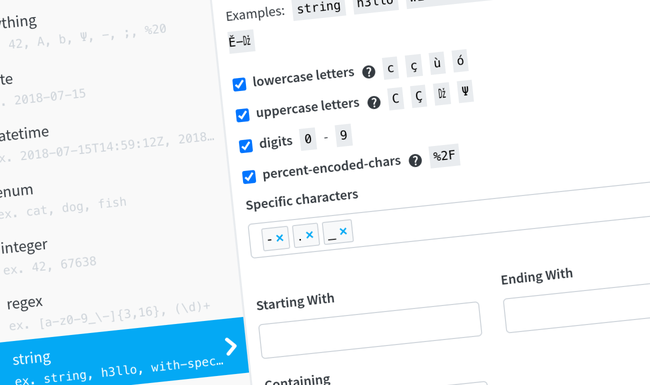
Utilisez des marqueurs pour les règles avancées
La création de règles de redirection qui correspondent à plusieurs URLs se fait généralement à l'aide d'expressions régulières, qui ne sont pas des plus conviviales !
Notre moteur de redirection permet de créer des règles de redirection basées sur des regex de manière simple, en utilisant l'assistant de création de règles. Nous fournissons de nombreux types de marqueurs et options de configuration.
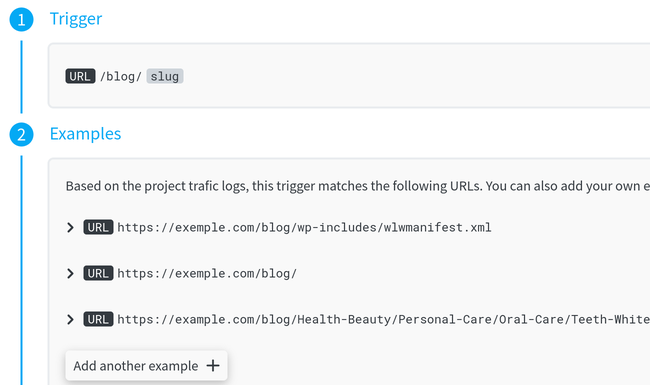
Utilisez les logs comme des exemples
La création de redirections soulève un certain nombre de questions : cette règle sera-t-elle utilisée ? Va-t-elle entrer en collision une autre règle ? Fonctionnera-t-elle bien comme je l'attends ?
redirection.io aide à répondre à ces questions grâce à la notion d'exemples. Les logs réels de trafic sont utilisés pour générer des exemples de requêtes, qui sont attachés aux règles nouvellement créées (et vous pouvez ajouter vos propres exemples).
Avant de publier un nouvel ensemble de règles, tester que tous les exemples fonctionnent comme prévu permet d'éviter les mauvaises surprises !
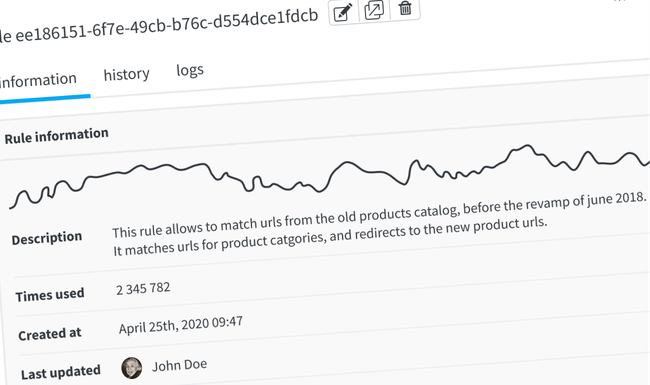
Affichez les détails d'utilisation de chaque règle
Dès qu'une règle est publiée, nous enregistrons chacune de ses utilisations et offrons un aperçu complet de l'impact de la règle sur le trafic de votre site Web. Vous pouvez également lire tout l'historique de la règle, voir qui l'a modifiée et combien de fois elle a été utilisée depuis.
Dans le panneau de détails d'une règle, il est possible d'obtenir la liste de toutes les requêtes qui ont été traitées par cette règle, ce qui est utile pour analyser l'efficacité de votre plan de redirections.
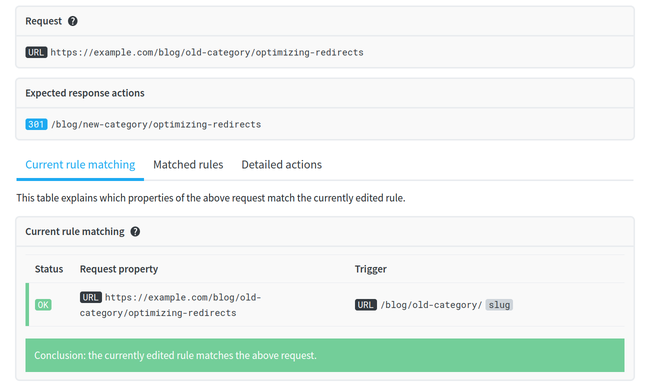
Tester les règles avant qu'elles ne soient appliquées en production
Les exemples attachés aux règles de redirection agissent comme des tests unitaires : nous fournissons un inspecteur d'action en profondeur, qui explique pourquoi une requête est mise en correspondance ou non, donne la liste de toutes les règles mises en correspondance dans le jeu de règles pour cette requête, et calcule la réponse attendue pour cette requête.
L'utilisation de redirection.io permet d'éviter de déployer en production des redirections non testées.

redirection.io nous a fourni la solution parfaite pour nos besoins de migration de domaine. Sa fonctionnalité d'importation en masse et son interface conviviale ont rendu le processus fluide et efficace, nous faisant gagner du temps et évitant les erreurs potentielles.
Voir les autres fonctionnalités
Logguez tout le trafic
Collectez tout le trafic HTTP de votre site Web, obtenez des informations et des rapports, et repérez facilement les erreurs. Recevez le résumé hebdomadaire tous les lundis, pour vous assurer que votre site Web fonctionne bien.
Configurez des redirections
Configurez des redirections à des fins marketing, pour corriger un contenu déplacé, pour rediriger un utilisateur en fonction de son emplacement géographique, etc.
Règles SEO avancées
Utilisez des déclencheurs et des actions pour effectuer des améliorations SEO en quelques clics !
Remplacez les métadonnées SEO en quelques secondes, ou poussez les données structurées dans votre site Web.
La performance au centre
Notre solution a été conçue en mettant l'accent sur les performances. Découvrez comment faire évoluer votre utilisation de redirection.io, pour servir des centaines de milliers de redirections.
Un crawler est inclus
Notre crawler complet est disponible directement dans l'interface graphique de redirection.io. Découvrez les optimisations possibles sur votre site, et mettez-les immédiatement en place avec redirection.io !
Sécurité et résilience
redirection.io a été conçu et construit en tenant compte des préoccupations de sécurité et de résilience. L'architecture de la plateforme offre la meilleure sécurité et fiabilité pour votre projet.
Imports et exports
redirection.io permet d'importer et d'exporter vos données de trafic et les règles de votre projet de manière très rapide et intuitive, sous forme de fichiers CSV et JSON exhaustifs.
Générez des redirections
Lors de la refonte d'un site web, vous devrez certainement configurer des redirections vers les nouvelles URLs. Notre générateur de plan de redirection crée des règles de redirection basées sur la proximité sémantique et la hiérarchie des liens.